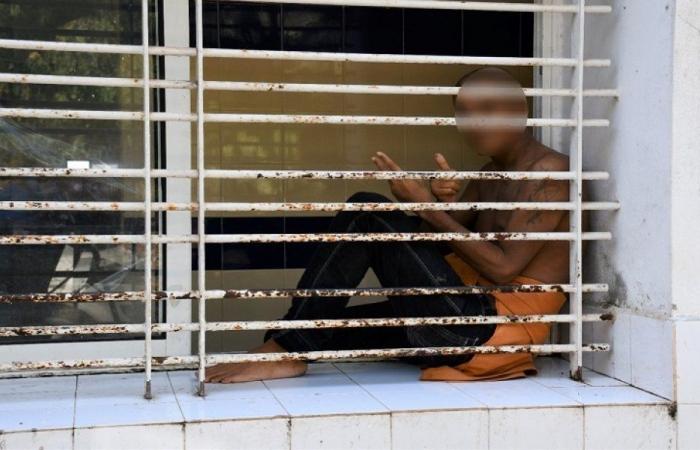The National Prevalence Survey of Mental Disorders (2003-2006), conducted among the population aged 15 and over, revealed that these disorders constitute a pathological burden important and represent a major challenge for public health. This observation has led to increased awareness of the scale of the problem and has given rise to the adoption of several national strategies in this area.
The control mission of the Court of Auditorsthe conclusions of which were published in its annual report for 2023-2024, aims to ensure that the system of mental healthin its different dimensions, is able to respond in an appropriate manner to the needs of the population. She addressed, in particular, aspects relating to the prevention in terms of mental health, the availability and accessibility ofcare offeras well as on the conditions of patient care.
A system under pressure
Morocco faces a pathological burden important in terms of mental health. The National Survey on Mental Disorders (2003-2006) had already revealed the extent of the situation, but since then, little progress has been made. Specialized establishments are insufficient in number and poorly distributed, which limits access to care in many regions. Morocco also has a paltry number of psychiatrists and of psychologists (In 2023, Morocco had 407 psychiatrists (public and private combined) and only 32 child psychiatrists, i.e. a density of 1.13 psychiatrists per 100,000 inhabitants)amplifying the territorial disparities and making care even more difficult to access.
In detail, the report indicates that the number of public health establishments specializing in psychiatry in the public sector amounts to 43 units, including 11 psychiatric hospitals and 32 psychiatric services integrated into public hospitals. As for the private sector, it is limited to only four (04) clinics.
Population coverage is marked by significant geographic disparities, with more than half of the prefectures and provinces not having these establishments. This is despite the provisions of the dahir relating to the prevention and treatment of mental illnesses and the protection of affected patients (dahir n° 1.58.295), which stipulates that each prefecture or province must have a “public accommodation service ” dedicated to psychiatry.
Lack of specialized hospitals for children and seniors
The needs of the elderly represent nearly 11% of the demand for psychiatric care in the public sector and more than 8% of hospitalizations. However, Morocco only has one unit dedicated to this category: theAr-Razi Hospital in Salé, with only 12 specialized beds for neurocognitive disorders. Other disorders are treated in adult psychiatric hospitals, which are unsuitable for the specific needs of seniors, often suffering from concomitant physical illnesses. In addition, these hospitals are often located on the outskirts, making access even more difficult.
Regarding child psychiatry, the offer is extremely limited, or even non-existent in several regions. The country has only 32 outpatient care units, including 13 private clinics, mainly concentrated in Casablanca (12) and Marrakech (1). On the public side, only four regions have 1 to 2 child psychiatrists (Casablanca-Settat, Tangier-Tetouan-Al Hoceima, Marrakech-Safiet Laâyoune-Sakia El Hamra). For thehospitalisationonly one 16-bed unit is available nationally, although ministerial strategies since 2012 aim to strengthen this offer.
Concentration and inequality in the distribution of psychiatric beds
Morocco has 2,466 psychiatric beds in the public sector, a ratio of 6.86 beds per 100,000 inhabitants, lower than the world average of 10.8 beds. The 2025 health plan aims to reach 10 beds per 100,000 inhabitants.
However, nearly 48% of reception capacities are concentrated in two regions: Casablanca-Settat and Marrakech-Safi. Psychiatric hospitals hold the majority of beds (62% of total capacity), while services integrated into general hospitals are poorly developed. However, the WHO recommends “deinstitutionalization” to integrate psychiatric care into general hospitals.
The Ministry of Health and Social Protection has incorporated this recommendation by programming the creation of 30 to 40 integrated psychiatric beds in under-equipped regions, with a target of three units per year.
Fragmented and inadequate care
The Court of Auditors points to an incomplete organization of care. Due to a lack of integration into primary care, patients are often referred to specialized structures, where post-hospitalization follow-up is almost non-existent. Result: frequent readmissions, oscillating between 67% and 90%, caused by the lack of continuous care.
This situation is aggravated by an insufficient legal framework and fragmented governance, which limit coordination between the different actors in the health system. Many diagnoses remain imprecise, sometimes leading to unjustified hospitalizations.
Also, the lack of effective implementation of a progressive care pathway seriously harms the quality of mental health care in Morocco. Clarifying roles, improving infrastructure and better coordination are essential to guarantee monitoring adapted to the needs of patients and overall effectiveness of the mental health system, underlines the report.
The Court’s warnings
The Court warns of the social and economic consequences of such lack of attention to mental health. Without adequate prevention, untreated mental disorders lead to high costs for the health system and hinder the social and professional reintegration of patients.
In addition, Morocco remains below international standards in terms of mental health, risking worsening its delay in the overall reform of its health system.
Recommendations for structural change
To face these challenges, the Court of Auditors offers concrete solutions:
- Development of an integrated policy: Define clear guidelines taking into account the main challenges of this system, in particular the strengthening of mental health, the prevention of psychological illnesses and the development of a care offer adapted to the needs of populations and territories.
- Establishment of an appropriate legal framework: Develop a legal framework that takes into account the specificities of mental health, as well as an appropriate governance framework including all stakeholders involved in this area.
- Creation of an epidemiological surveillance and monitoring system: Establish a system based on an effective and coordinated information system.
- Design and implementation of a multisectoral strategy adapted to mental health: This strategy should include the following elements:
- Strengthening mental health prevention, in particular through the establishment of a communication program to combat negative stereotypes linked to mental disorders, the development and implementation of an awareness plan to encourage professionals non-specialized health services to detect mental and psychological disorders early and the extension of the territorial coverage of centers dedicated to children, young people and addictions, in collaboration with partners, while providing them with the necessary resources.
- Improvement in the provision of mental health care:
- Ensure equitable distribution of mental health establishments, public and private, throughout the territory.
- Establish organizational mechanisms at the national and regional level to guarantee their availability in all regions.
- Continue the integration of mental health services in public hospitals and develop the provision of care at the level of outpatient establishments.
- Strengthening human resources: Increase the workforce in specialties related to patient care, while guaranteeing their availability to offer comprehensive and adapted care.
- Optimization of available resources:
- Establish a progressive care pathway for mental health, defining the areas of competence of each level according to the nature of the illnesses and their complexity.
- Strengthen the role of primary care centers in the care pathway.
- Develop intermediate care structures for the psychosocial rehabilitation of patients and their social reintegration.
- Develop and implement a program to modernize hospital infrastructure and improve patient accommodation conditions.
A national emergency
The mental health is an essential component of citizen well-being and social stability. By implementing the recommendations of the Court of AuditorsMorocco could not only respond to a health emergency, but also lay the foundations for a more inclusive and equitable health system. To do this, it is imperative that public authorities make this issue a priority.






